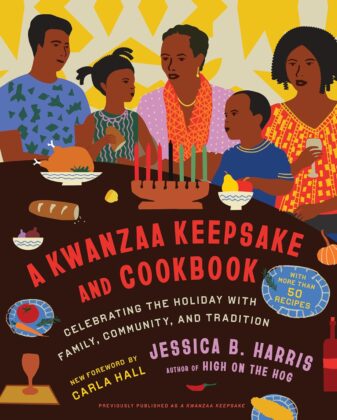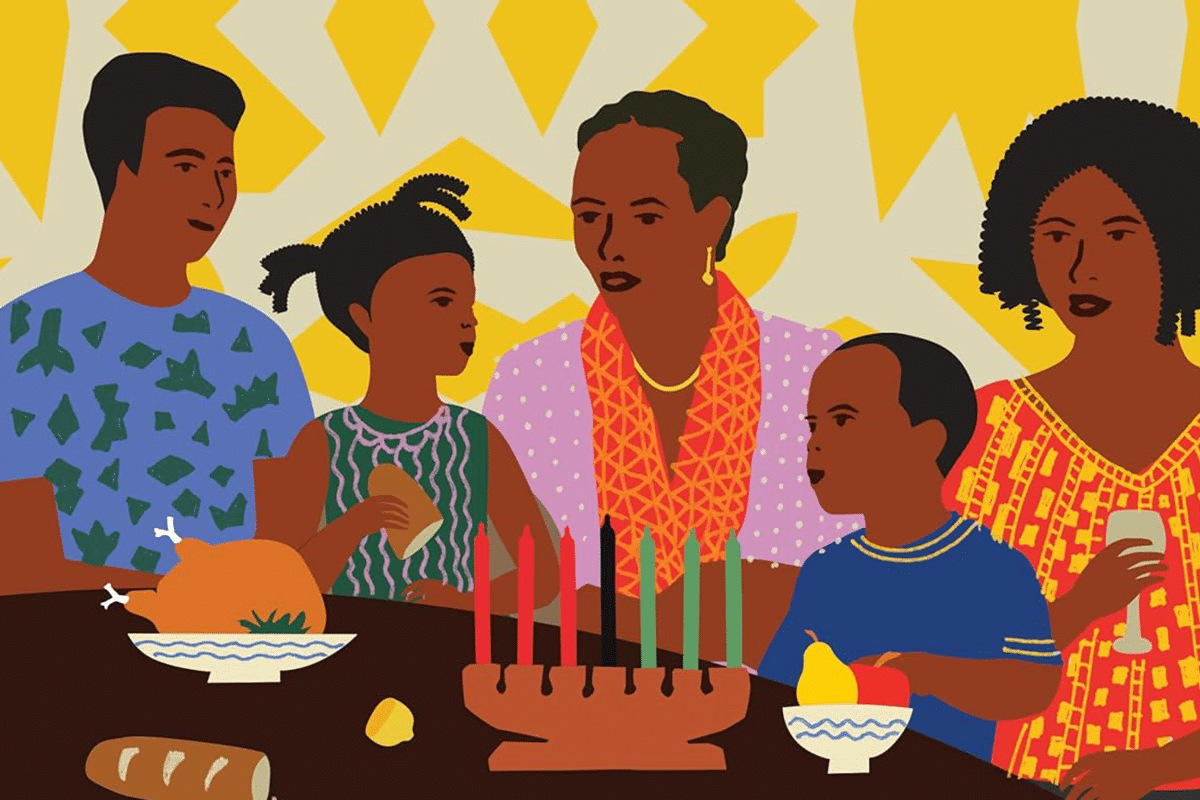Celebrating the Holiday with Family, Community, and Tradition by Dr. Jessica B. Harris
A Kwanzaa Keepsake and Cookbook: Celebrating the Holiday with Family, Community, and Tradition, by Dr. Jessica B. Harris, is a fascinating small book with a colorful cover, originally published as A Kwanzaa Keepsake: Celebrating the Holiday with New Traditions and Feasts in 1995.

For those not yet familiar with this eminent culinary historian, winner of the James Beard Lifetime Achievement Award, The Netflix series High on the Hog, based on her New York Times Best Seller, is a wonderful introduction to her work.
Acclaimed cookbook author Jessica B. Harris has spent much of her life researching the food and foodways of the African Diaspora. High on the Hog is the culmination of years of her work, and the result is a most engaging history of African American cuisine. Harris takes the reader on a harrowing journey from Africa across the Atlantic to America, tracking the trials that the people and the food have undergone along the way.—AMAZON: A Culinary Journey from Africa to America
The foreword to the newer edition, written by Carla Hall, is a moving ode to the two women’s friendship. Hall is an American chef and television personality who appeared on two seasons of Top-Chef and was a cohost on TV show The Chew. She writes:
“I am honored to recommend this book, and certain that Jessica’s insights will not only inspire but resonate deeply, just as her friendship and scholarship have enriched my life. A Kwanzaa Keepsake and Cookbook is a testament to the shared histories that shape our experiences, underlining the power of stories to forge bonds and enlighten paths–whether previously traveled or yet to come.”
The book begins with the question: What is Kwanzaa?
Briefly (and this summary does NOT do justice to the actual text), the American festival was established in 1966 to fill a need for Black Americans’ cultural affirmation.
It is celebrated at the end of the year, like Christmas, Diwali, and Chanukah, but it is not designed as a replacement or alternative to those celebrations. With traditions that have roots in Africa, the “fruits of the tree are truly Black American.” Kwanzaa is a time for reflection and self-affirmation, but the author notes that the holiday’s commercialization has been steadily increasing. This book offers ways to celebrate family and ritual. There are simple projects for each night of Kwanzaa with blank pages throughout the book for recording recipes and family history, making it a meaningful keepsake.
Dr. Harris instructs the reader to put as much effort into the preparation for the holiday as for the festivities. And that preparation starts with learning about the celebration and its original purpose. She recommends the writings of the man who created the holiday, Dr. Maulana Karenga. Each chapter, one for each of the seven-night festivals, explains the symbols and rituals of the night and presents several short biographies of ancestors as springboards for discussion. There is a nightly menu with recipes, with the significance of each dish described.
"The recipes are designed so that “all members of the family, whatever their ages and abilities, can participate in the creation…Kwanzaa is about unity. Never is a family or a group more together than when it sits down to table.””
A recipe called Seasoned Olives starts the first menu of the first night of Kwaanza, Umoja. This meal is a multinational supper highlighting the union of all peoples of African descent. Canned ripe olives are marinated in dried thyme, minced garlic, chile pepper, salt, pepper, and olive oil.
“In Brazil. Olives appear frequently on the table as appetizers to heighten the appetite before a meal. This is probably a part of the nation’s Lusitanian heritage.”
The other appetizer is Pan-Roasted Almonds.
“Driving into the Ourika Valley outside of Marrakesh, Morocco, one may be stopped along the way by small boys selling geodes. When these dull rocks are broken open, they reveal crystallie forms of amethyst and other brilliant delights. The same young boys also sell almonds, wonderful almonds that have a taste like those nowhere else on earth…”
For anyone interested in learning about Kwanzaa, this book is packed with great material written by a masterful storyteller. It would make a welcome gift for all ages wishing to celebrate Kwanzaa, a holiday that offers continuity and hope for the future. ![]()
